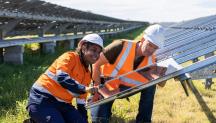

-
-
IRENA Coalition for Action (2021), Companies in transition towards 100% renewables: Focus on heating and cooling, International Renewable Energy Agency, Abu Dhabi.
Copied
/-/media/Files/IRENA/Agency/Publication/2021/Feb/IRENA_Coalition_Companies_in_Transition_towards_100_2021.pdf?rev=80bdf0b32a4245e883eb14ebb7417306
Copied
Companies in transition towards 100% renewable energy: Focus on heating and cooling
Newsletter
The IRENA Coalition for Action brings together leading renewable energy players from around the world with the common goal of advancing the uptake of renewable energy. The Coalition facilitates global dialogues between public and private sectors to develop actions to increase the share of renewables in the global energy mix and accelerate the global energy transition.
The Coalition has produced a series of white papers and analyses that document case studies and best practices for achieving 100% renewable energy, including recommendations to policy makers on how to support an accelerated energy transformation.
This white paper developed by the Coalition discusses how companies can increase the share of renewable energy in their heating and cooling operations. Although more and more companies are sourcing renewable electricity, corporate sourcing of renewable heating and cooling is still in the early stages of development given its context-specific and decentralised nature. With heating and cooling representing approximately 75% of energy used in industry, there is significant potential to accelerate the decarbonisation of industry through renewables.
Key takeaways for governments:
- Setting national and subnational targets for 100% renewable energy across all end-use sectors, including heating and cooling, is key to driving the energy transformation in the industrial sector.
- Long-term government planning is particularly important for decarbonising heating and cooling in industry.
- Implementing ambitious regulatory, fiscal and financial policies and incentives will help increase the share of renewables in heating and cooling.
- Improving access to private capital for energy transition-related technologies will encourage essential long-term investments.
- Exploring innovative sourcing models for renewable heating and cooling will further scale up progress.
Key takeaways for companies:
- Switching to renewable energy heating and cooling brings important benefits beyond emission reduction.
- Setting long-term corporate renewable heating and cooling targets and implementation strategies accelerates the decarbonisation of operations.
- Considering the local context is key when choosing among available pathways and technologies for renewable heating and cooling.
- Coupling renewable energy sourcing with measures to reduce energy demand and improve energy efficiency is crucial.
- Conducting further research and development across innovative renewable energy technologies and infrastructure for heating and cooling is needed.
- Improving data collection on companies'; renewable heating and cooling operations can help monitor and adjust strategies in support of established decarbonisation targets.
- By working with local actors, such as governments, utilities, communities and NGOs, companies can further accelerate the energy transformation.




